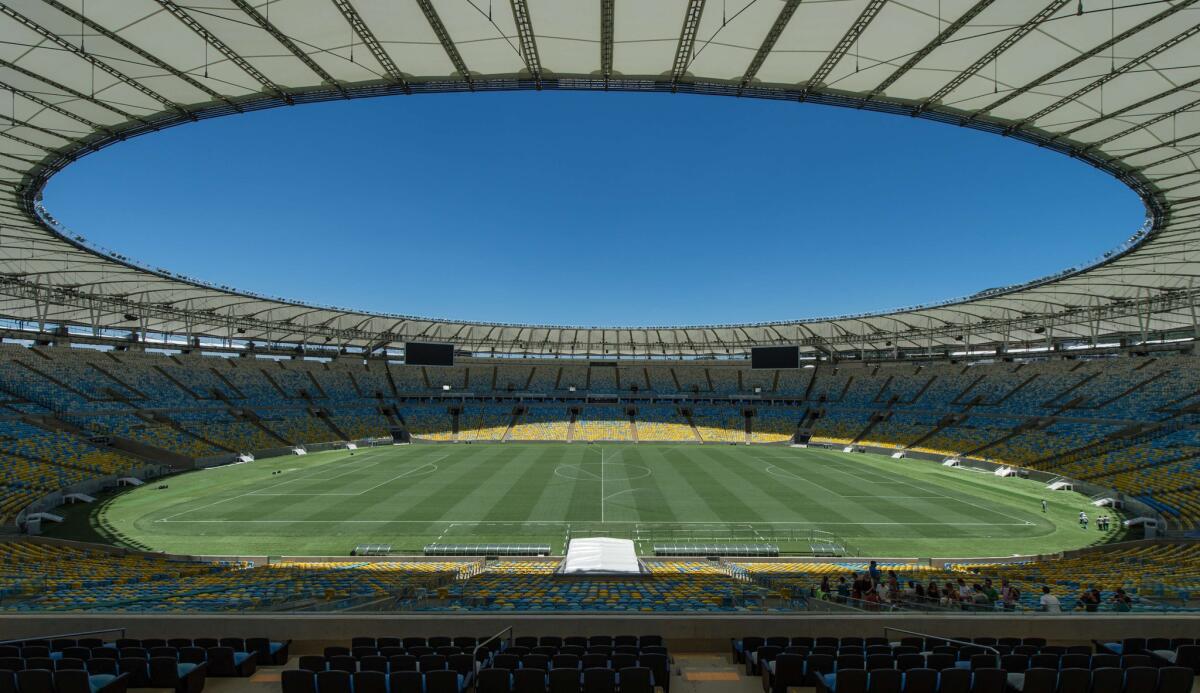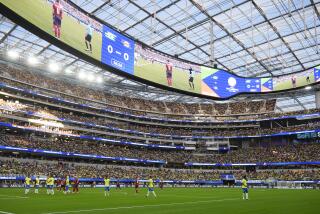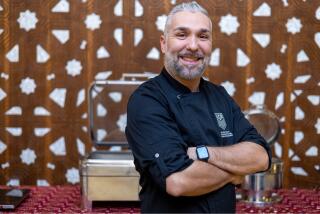For researcher, World Cup is a grass-roots endeavor

- Share via
Like most kids growing up in Brazil, Roberto Gurgel dreamed of being on the field for a World Cup.
That never happened. So this summer, Gurgel is settling for the next-best thing by helping to build five of the fields that will be used for the first World Cup in his native country in 64 years.
Gurgel is executive director of research for Sod Solutions, a South Carolina-based company that develops and licenses varieties of grass. One of those varieties, a deep blue-green Bermuda called Celebration, will be used in five of the 12 World Cup venues this summer.
Gurgel said the Maracana, the stadium in Rio de Janeiro that will play host to the final, as well as venues in Brasilia, Salvador, Belo Horizonte and Fortaleza, all have specific issues that required a unique turf like Celebration, which grows differently from most Bermuda.
“It has a very good ability to grow under a significant amount of shade,” he said. “Celebration was selected for those stadiums because a lot of them have very tall structures and places for the fans … that project a lot of shade on the grass.”
The grass is also durable and recovers quickly but it doesn’t do well in places like Sao Paulo, which is expected to be cool.
“There’s a lot of science involved. It’s kind of a tricky thing,” said Gurgel, who has made several trips to the sod farm in Brazil where the grass is being grown, then visited again after the grass was installed ahead of last year’s Confederations Cup.
He’ll follow the World Cup on television, though, and admits he watches the games a little differently from most fans.
“I look more for the grass,” he said. “I’m all the time hoping that the camera zooms in to the play so I can look at the grass and not so much at the players or the game. So yes, lately I cheer more for the grass than for the team itself.”
Which isn’t to say he doesn’t have a favorite squad.
“I hope I can watch the final game in Maracana, with Brazil playing somebody,” he said.
Root, root, root for the home team
Union bosses in Germany have called on employers to be patriotic and cut their soccer-supporting workers a break by allowing them to report late the day after German games in the World Cup, according to Britain’s Guardian newspaper.
But the request also reveals a healthy amount of optimism about second-ranked Germany’s chances in Brazil. Most of the team’s games in group play will start relatively early. But if Germany advances to the knockout stages, those games could end after midnight in Europe.
“It would a noble move by employers if they showed a bit of flexibility during the World Cup, “ Robert Feiger, head of the construction, engineering and forestry union IGBAU, told the newspaper. “For Germany games after 10 p.m., work should start a little bit later if possible.”
Core of Brazil team set
Brazil Coach Felipe Scolari has told nine players they are on his team for the World Cup and the names include no surprises: David Luiz, Oscar, Ramires, Willian, Paulinho, Julio Cesar, Thiago Silva, Fred and Neymar.
Scolari will announce the official 23-man squad May 7.
Twitter: @kbaxter11
More to Read
Go beyond the scoreboard
Get the latest on L.A.'s teams in the daily Sports Report newsletter.
You may occasionally receive promotional content from the Los Angeles Times.







